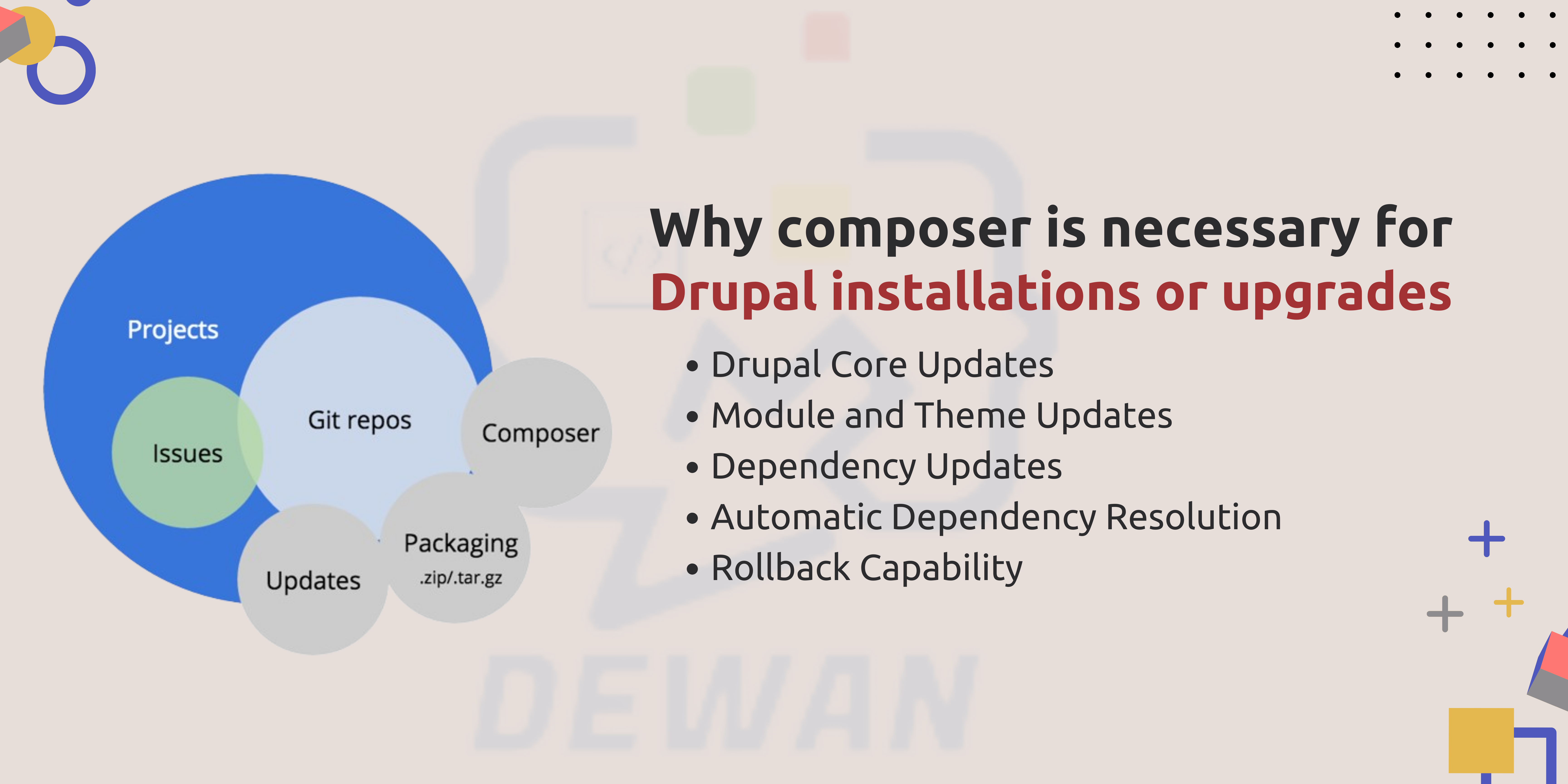
Introduction
Composer is a vital device for managing dependencies in Drupal installations and enhancements. As Drupal has developed, it has embraced a more modular structure, counting on external libraries and components for numerous functionalities. Composer allows you to manage those dependencies seamlessly, ensuring that Drupal middle, modules, subject matters, and libraries are efficaciously mounted and incorporated into your Drupal web page.
one of the key advantages of Composer is its capacity to handle dependency resolution. it could automatically fetch and install appropriate versions of all the dependencies required by way of your Drupal mission, together with both direct dependencies and their dependencies (known as transitive dependencies). This guarantees that your Drupal site has all the important additives to function effectively.
Composer additionally simplifies the system of autoloading lessons in Drupal. It generates an autoloader in your assignment, because of this you do not need to manually encompass php documents the use of the specified statements. This no longer makes development extra efficient but also improves the performance of your Drupal site.
moreover, Composer enables you to specify model constraints for your dependencies. This helps ensure that your Drupal website makes use of like-minded versions of libraries and components, reducing the danger of version conflicts and ensuring the steadiness of your web page.
further to handling core and module dependencies, Composer additionally enables the integration of community-contributed extensions into your Drupal website. Many Drupal modules and subject matters are to be had as Composer programs, making it easy to feature new capabilities and capabilities to your website. average, Composer is important for Drupal installations and upgrades as it simplifies dependency management, guarantees model compatibility, improves performance, and helps the integration of network-contributed extensions.
Dependency Management
1. External Libraries
Drupal is based on outside libraries and components for diverse functionalities. Composer helps control these dependencies by fetching and installing the desired libraries, ensuring that Drupal has all the necessary additives to characterize correctly.
2. Version Compatibility
Composer allows you to specify version constraints to your dependencies. This ensures that Drupal makes use of well-matched versions of libraries and additives, reducing the threat of model conflicts and ensuring the stability of your web page.
3. Autoloading
Composer generates an autoloader for your Drupal project, which eliminates the need for manual statements to load PHP classes. This simplifies development and improves the performance of your Drupal site.
4. Dependency Resolution
Composer resolves dependencies recursively, ensuring that all dependencies of your Drupal project are satisfied. This includes not only direct dependencies but also dependencies of dependencies (transitive dependencies).
5. Community Contributions
Many Drupal modules and themes are available as Composer packages, making it easy to add community-contributed extensions to your Drupal site. Composer simplifies the process of integrating these extensions into your site.
In summary, Composer is essential for Drupal installations and upgrades because it simplifies dependency management, ensures version compatibility, improves performance, and facilitates the integration of community-contributed extensions.
Autoloading

1. Efficient Class Loading
Composer generates an autoloader for your Drupal project, eliminating the need for manual inclusion of PHP files using required statements. This makes class loading more efficient and helps improve the overall performance of your Drupal site.
2. PSR-4 Standard Compliance
Composer follows the PSR-4 standard for autoloading, which defines a uniform way to map PHP namespaces to file paths. This standardization simplifies autoloading and ensures consistency across different PHP projects.
3. Namespace Resolution
Using Composer's autoloader, Drupal can robotically clear up magnificence names to their corresponding file paths, making it less difficult to arrange and manipulate your Drupal task's codebase.
4. Simplified Development
Composer's autoloading feature simplifies the development process by automatically loading classes as needed, reducing the amount of manual coding required to manage dependencies.
You may also like to read : About Me
5. Improved Performance
Because Composer's autoloader loads lessons simplest while they're wanted, it could help enhance the performance of your Drupal site by lowering the quantity of reminiscence and processing electricity required to load lessons.
In conclusion, Composer's autoloading function is essential for Drupal installations and enhancements as it allows improve the efficiency, enterprise, and overall performance of your Drupal assignment's codebase.

Version Control
1. Dependency Versioning
Composer allows you to specify version constraints for your Drupal project's dependencies. This ensures that your Drupal site uses compatible versions of libraries and components, reducing the risk of version conflicts.
2. Semantic Versioning Support
Composer helps semantic versioning, which affords a clear set of policies for the way version numbers are assigned and incremented. This enables you to apprehend the impact of updating dependencies for your Drupal website.
3. Version Resolution
When you run composer install or composer update, Composer resolves dependencies based on the version constraints specified in your composer.json file. It fetches and installs the appropriate versions of dependencies to ensure compatibility.
4. Lock File
The composer generates a composer.lock file that records the exact versions of all dependencies installed in your Drupal project. This lock file guarantees that the same variations of dependencies are established in all environments, presenting consistency and predictability.
5. Update Management
Composer makes it easy to update dependencies to newer versions. You could use composer replace to fetch and install today's variations of dependencies that meet the version constraints laid out in your composer.json file. Usually, Composer's version control features help you control dependencies effectively, making sure that your Drupal web page makes use of like-minded variations of libraries and additives and making it easier to update dependencies to more modern versions.
Updates and Upgrades
1. Drupal Core Updates
Composer simplifies the process of updating Drupal Core to newer versions. You can use Composer to update Drupal core, along with its dependencies, by running Composer update Drupal/core –with-dependencies.
2. Module and Theme Updates
Composer also makes it easy to update modules and themes to their latest versions. You can update individual modules or themes by specifying their names in the composer.json file and running composer update.
3. Dependency Updates
Composer resolves and updates dependencies to their today's variations based totally on the model constraints distinctive inside the composer.json record. This ensures that your Drupal website uses state-of-the-art like-minded variations of libraries and components.
4. Automatic Dependency Resolution
Composer automatically resolves version conflicts and updates dependencies accordingly when you run composer update. This simplifies the process of keeping your Drupal site up to date.
5. Rollback Capability
Composer allows you to roll back updates in case of issues. The composer replaces the command updates dependencies and generates a composer.lock report. If any problems arise, you could revert to the preceding nation by usage of the composer deploy command, which installs dependencies primarily based on the composer.lock file. In precis, Composer's ability to manipulate updates and upgrades in Drupal simplifies the system of keeping your Drupal website online up to date with the cutting-edge core, module, and subject matter variations, at the side of their dependencies.
Dependency Resolution
1. Transitive Dependencies
Drupal has dependencies that may themselves have dependencies (transitive dependencies). Composer resolves these transitive dependencies recursively, ensuring that all required dependencies are installed.
2. Version Conflict Resolution
When multiple dependencies require different versions of the same library or component, Composer resolves version conflicts automatically. It selects the most appropriate versions based on version constraints specified in the composer.json file.
3. Consistency and Stability
Composer's dependency resolution ensures that your Drupal project uses a consistent set of dependencies across different environments. This helps maintain stability and predictability in your Drupal site's behavior.
4. Efficiency
By automatically resolving dependencies, Composer saves you time and effort in managing dependencies manually. It fetches and installs the required dependencies efficiently, allowing you to focus on developing your Drupal site.
5. Dependency Locking
The composer generates a composer.lock file that records the exact versions of all dependencies installed in your Drupal project. This lock record guarantees that equal versions of dependencies are established in all environments, supplying consistency and predictability. In the end, Composer's dependency decision is crucial for Drupal installations and enhancements as it ensures that everyone's dependencies are happy, resolves version conflicts, continues consistency and stability, and improves the efficiency of handling dependencies.
Community Contributions
1. Broad Range of Extensions
The Drupal network is colorful and active, with builders continuously growing new modules and topics to enhance Drupal's capability. Composer lets you effortlessly combine these community-contributed extensions into your Drupal web page, increasing its abilities.
2. Quality and Security
Network-contributed extensions undergo peer overview and are difficult to Drupal's coding requirements and safety practices. Using the usage of Composer to put in these extensions, you can be assured of their exceptional protection.
3. Ease of Installation
Composer simplifies the installation process for network-contributed extensions. you could upload the extension's package call for your composer.json file and run composer deploy or composer update to download and deploy the extension and its dependencies.
4. Version Compatibility
Composer helps ensure that community-contributed extensions are compatible with your Drupal site by managing version constraints. You can specify the version of the extension you want to install in your composer.json file, and Composer will handle the rest.
5. Contribution and Collaboration
Via the usage of community-contributed extensions, you contribute to the Drupal atmosphere and guide the work of other developers. you can also collaborate with different developers by contributing to current extensions or growing your very own. overall, Composer's aid for network-contributed extensions complements the ability, functionality, and security of your Drupal website online, allowing you to leverage the collective knowledge and creativity of the Drupal network.
Composer for Drupal

Conclusion
Composer is important for Drupal installations or improvements because it simplifies the management of dependencies, ensuring that Drupal core, modules, themes, and libraries are established efficaciously and incorporated seamlessly. It additionally helps maintain model compatibility, improves overall performance by way of producing an autoloader, and helps the integration of network-contributed extensions. universal, Composer complements the development revel in and functionality of Drupal websites by using streamlining the setup and management of dependencies.
